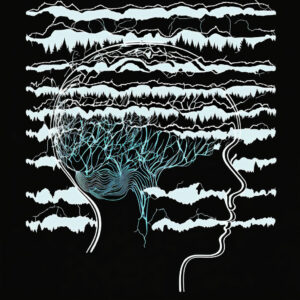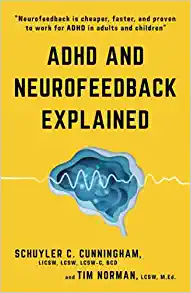Depression can look like ADHD. It can make it hard to listen to others, pay attention in meetings, focus during the work day, or have energy to go about your day.
Medication for depression is a slog. Six weeks to see if it even works. Then it can cause weight gain, increase suicidal thoughts, and destroy your desire to have sex.
Talk therapy is useful but can be tiresome. We aren’t your “Uh-huh tell me more” kind of therapists. We offer neurofeedback for depression.
Neurofeedback for Depression
Neurofeedback is the practice of training the brain to function better. There are a few different kinds of neurofeedback. DCNE also uses many forms of amplitude training to target brain waves, including Alpha/Theta training, as well as z-score training, and infra-slow fluctuation (ISF) neurofeedback. These are all accepted forms of neurofeedback and can be very effective.
A QEEG – See the Change you Wish to Be
Your neurofeedback training begins with a QEEG. A QEEG is the baseline measure of your brain wave activity. We turn the data from a QEEG into a Brain Map. The Brain Map is a summary of the brain wave activity during the QEEG.
We have invested in the extensive training required to administer and interpret a QEEG. We are the only one in DC who has that additional training. If you don’t have a QEEG to begin with, your neurofeedback provider has NO evidence about how to help you. That is why we start with a QEEG.
From the Brain Map we decide the best form of neurofeedback training for your brain and to meet your goals. When you’re done with your neurofeedback training we take another QEEG and make another Brain Map. Then we SHOW YOU the results so you can see for yourself.
When you can see the change, you can be the change.

Neurofeedback Training
Neurofeedback training is the next step after the QEEG. It is the actual practice of training the brain to function better.
Neurofeedback trains the brain to function better but rewarding and/or inhibiting brain waves that might prevent the brain from functioning in the healthiest manner. The goals of training are always set by you, so that we know which mental health symptoms we want to reduce or enhance.
Why Choose Us for your Neurofeedback for Depression
Yes we have the credentials. But what we want you to know is that:
We put you front and center in this process
We have easy access to evening and weekend appointments
We have a comfortable and private office so you can relax during your training
We have male and female providers to make sure you’re comfortable
We can be reached by HIPAA compliant text messaging for easy communication
Our Credentials
Schuyler Cunningham, our Director, has written a book on neurofeedback and his chapter on neurofeedback is published in the Social Worker’s Desk Reference Guide (see chapter 60).
Schuyler trained with Mark Smith, who invented Infra-Low Frequency Neurofeedback. Schuyler continues to train with Stephen Warner, PhD and Clinical Director of Stress Therapy Solutions. Schuyler regularly teaches other providers how to use neurofeedback.
Neurofeedback is an evidence based treatment for depression. 50 years of advanced research shows how neurofeedback is effective and is a compliment to the current standard of care.
We have advanced training and have been working with neurofeedback for over 10 years.

Begin Neurofeedback for Depression in Washington, DC
Our clients love that neurofeedback works, the results stick over time, and that they can often come off or reduce the dose of their medications.
We will guide you through the process. We offer consultations for anyone interested in our services or who want to know more. You can book your consultation on our website, by texting us at 202-998-2343 (ADHD), or by emailing [email protected].
We offer free consultations because we want to answer your questions before we begin neurofeedback for depression. We are your resource, even if you don’t work with us.
Beyond Neurofeedback for Depression
In addition to cutting edge neurofeedback, we offer:
- Neurofeedback for ADHD
- Comprehensive mental health assessments
- ADHD mental health assessments for children and adults
- EMDR focused therapy for trauma
- ADHD focused therapy
- Therapy for Anxiety
- Therapy for Depression
We aren’t just an “uh huh, tell me more” kind of therapy practice. We want to get in there with you and provide real tangible results. We do this through assessments, behavioral counseling, and emotional processing to deal with the stigma of mental health and not feeling good enough.
It is a complete package to get you where you want to be. Get in touch with us today.
Leave a Reply